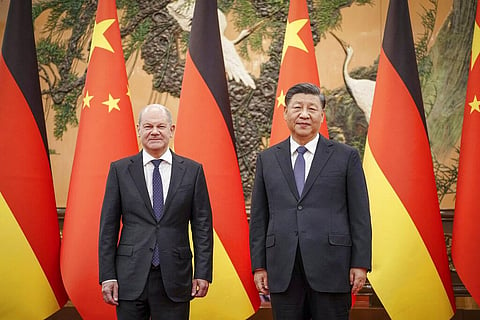

BEIJING: German Chancellor Olaf Scholz met with Chinese President Xi Jinping in Beijing on Friday for a one-day visit that has drawn criticism over China's tacit support for Russia in its war on Ukraine and lingering controversies over economic ties and human rights issues.
Scholz, who is travelling with several top German business leaders, received a formal welcome from Xi, who was recently re-appointed head of the ruling Communist Party, at the Great Hall of the People in the heart of Beijing. Xi noted that Scholz's visit comes as the sides mark more than 50 years of diplomatic relations dating back to when the countries, despite their fierce Cold War rivalry, relaunched economic exchanges that remain a key part of the relationship to this day.
"At present, the international situation is complex and changeable," Xi was quoted as saying by state broadcaster CCTV, without specifically mentioning Ukraine. "As influential powers, China and Germany should work together in times of change and chaos to make more contributions to world peace and development."
In his opening remarks, Scholz referred directly to the conflict that has created millions of refugees and upended world food and energy markets, saying, "We come together at a time of great tension," according to German news agency DPA. "In particular, I want to highlight the Russian war against Ukraine, which poses many problems for our rules-based world order," Scholz was quoted as saying.
Scholz also touched on global hunger, climate change and developing world debt as "important issues," DPA reported.
Scholz, who relies on a coalition of his Social Democratic Party, the Greens and the Free Democratic Party, has come under criticism for making the visit to China so soon after the 69-year-old Xi's triumph at last month's congress, in which he was named to a third five-year term and packed the all-powerful Politburo Standing Committee with committed allies who support his vision of tighter control over society and the economy and a more confrontational approach to the West.
The visit also occurred amid rising tensions over Taiwan and follows a U.N. report that said Chinese human rights violations against Xinjiang's Uyghurs and other ethnic groups may amount to "crimes against humanity."
Scholz was accompanied on the trip by about a dozen top German business leaders, including the CEOs of Volkswagen, BMW, BASF, Bayer and Deutsche Bank, most of which are doing a thriving business in China. Scholz will also meet company representatives in Beijing. That has some German observers questioning whether the country is becoming overly reliant on the Chinese market, just as it did with Russia for energy supplies.
Following lunch, Scholz and his delegation were to meet with Premier Li Keqiang, who nominally has responsibility over China's economy. Despite their political disputes, Scholz's visit reflects the importance of Germany's trade ties with the world's second-largest economy.
In an article for the German daily Frankfurter Allgemeine Zeitung, Scholz said he was travelling to Beijing "precisely because business as usual is not an option in this situation."
"It is clear that if China changes, the way we deal with China must also change," Scholz said, adding that "we will reduce one-sided dependencies in the spirit of smart diversification." Scholz also said he would address "difficult issues" such as the rights of ethnic minorities in Xinjiang, who have been detained in large numbers in what the U.S. and others have called a campaign of genocide.
Scholz is the first leader from the G7 group of industrialized nations to meet with Xi since the start of the global COVID-19 pandemic, which was first detected in China in 2019. The diplomatically delicate trip comes as Germany and the European Union work on their strategy toward an increasingly assertive and authoritarian Beijing.
Scholz's messages will face close scrutiny, particularly at home where some have criticized him for normalizing China's behaviour. While his nearly year-old government has signalled a departure from predecessor Angela Merkel's firmly trade-first approach, his trip follows domestic discord over a Chinese shipping company's major investment in a container terminal in Germany's crucial port of Hamburg.
With China still imposing tough COVID-19 restrictions, his delegation is moving in an anti-virus bubble, undergoing testing and won't stay in Beijing overnight. At just 11 hours, it is the shortest trip ever to China by a German leader. The aircrew who brought him to Beijing flew to South Korea to wait out the visit and avoid having to be quarantined. German officials say the trip is intended to probe where China is going and what forms of cooperation are possible.
An official pointed to China's "particular responsibility" as an ally of Russia to help end the war in Ukraine and press Moscow to tone down its nuclear rhetoric; to concerns over tensions in Taiwan and the broader region; to Germany's desire for a "level playing field" in economic relations; and to Scholz's current status as this year's chair of the Group of Seven industrial powers.